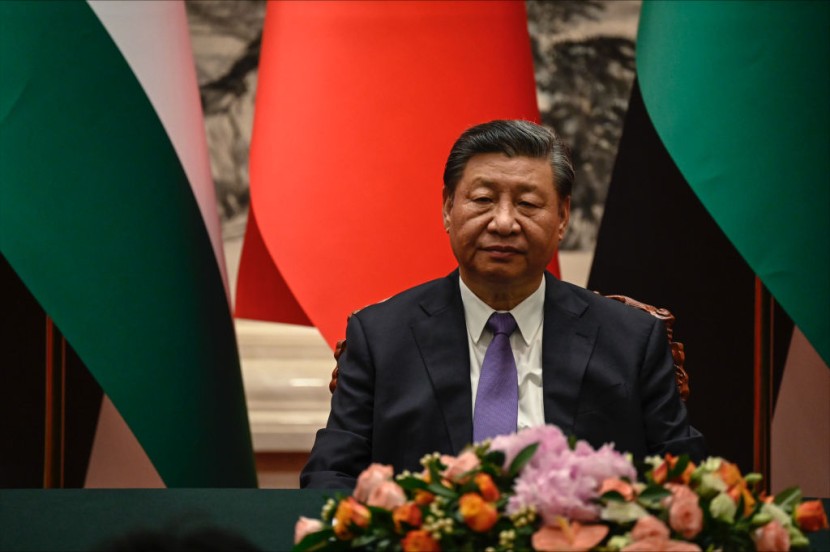Chinese officials have reportedly reached out to their Iranian counterparts, urging them to address the issue of ship attacks in the Red Sea by the Iran-backed Houthis.
The Chinese government has expressed concerns that these attacks could potentially impact their business relations with Iran. According to four Iranian sources and a diplomat familiar with the matter, discussions are underway to find a resolution to this issue.

Discussions regarding the attacks and trade between China and Iran were held at various recent meetings in Beijing and Tehran, according to Iranian sources. However, they have chosen not to disclose specific details regarding the timing or attendees.
"In light of potential consequences to their business with Teheran, China has made it clear that any harm to their interests would not be taken lightly."
"The Houthis should be urged to exercise restraint," stated an Iranian official familiar with the discussions, who spoke to Reuters anonymously.
The attacks, claimed to be in support of Palestinians in Gaza, have had a significant impact on shipping and insurance costs. They have disrupted a crucial trade route between Asia and Europe that is heavily utilized by ships from China.
According to four Iranian sources, Chinese officials refrained from making any explicit comments or threats regarding the potential impact on Beijing's trading relationship with Iran in the event of Houthi attacks damaging its interests.
China has emerged as Iran's largest trading partner over the past decade, but their trade relationship is heavily imbalanced. In 2023, Chinese oil refiners dominated the market for Iran's crude exports, purchasing more than 90% of the total. This was largely due to US sanctions deterring other customers and Chinese firms taking advantage of significant discounts.
China's crude imports rely on a variety of suppliers, making Iranian oil only a small portion of their overall supply. According to Iranian sources, Beijing has expressed its strong disapproval of any potential harm to vessels associated with China or any negative impact on Chinese interests.
According to an Iranian insider, Iran's decision-making process is heavily influenced by its regional alliances and priorities. While China is an important player for Iran, Tehran also has proxies in Gaza, Lebanon, Syria, Iraq, and the Houthis in Yemen.
When questioned about the discussions with Iran regarding the Red Sea attacks, China's ministry of foreign affairs stated that China values its friendship with the Middle Eastern countries and is dedicated to fostering regional security and stability, as well as pursuing mutual development and prosperity.
US Asks For China's Intervention Over Red Sea Tension
According to American officials, the US has requested China's assistance in persuading Tehran to control the Iran-backed Houthi rebels who are targeting commercial ships in the Red Sea. However, there has been limited indication of support from Beijing.
Officials have consistently brought up the issue with high-ranking Chinese officials over the past three months, urging them to send a message to Iran about avoiding further escalation of tensions in the Middle East following Hamas's attack on Israel on October 7 and the subsequent conflict.
US national security adviser Jake Sullivan and his deputy, Jon Finer, recently engaged in discussions with Liu Jianchao, head of the Chinese Communist party's international department, during meetings held in Washington, as confirmed by US officials. A state department official noted that Secretary of State Antony Blinken also brought up the matter.
However, US officials have stated that there is limited evidence of China exerting pressure on Iran to control the Houthis. China's recent statement, which urged "relevant parties" to ensure the safety of vessels in the Red Sea, a crucial trade route, was seen as a mild response.
On Wednesday, the Chinese foreign ministry expressed their concern about the disruption to civilian ships and emphasized their efforts to ease tensions in the Red Sea through close communication with relevant parties.
Nevertheless, the ministry expressed its concerns about the recent attacks on the Houthis, urging all parties involved to refrain from escalating the situation. It also emphasized that the UN Security Council has not authorized any country to use force in Yemen.
The Red Sea tension was also a result of the Gaza conflict, which needs to be resolved promptly, according to the ministry. In light of recent events, the United States and its allies have been actively targeting Houthi positions in Yemen. This military action is a direct response to a series of attacks on commercial vessels in the Red Sea, which have occurred since mid-November. On Monday, there were widespread strikes conducted by the US and UK.
In recent years, China has developed stronger commercial and diplomatic ties with Iran, which in turn supports the Houthis.
According to one official, the United States plans to address the matter of Iran and the Houthi attacks with Beijing. However, there is little optimism regarding any potential change in China's stance, Financial Times reported.
Related Article : US, UK To Impose New Houthi Sanctions Over Red Sea Shipping Attacks
© 2025 HNGN, All rights reserved. Do not reproduce without permission.








